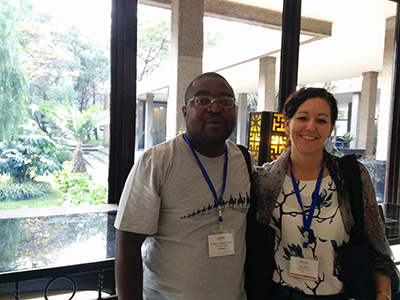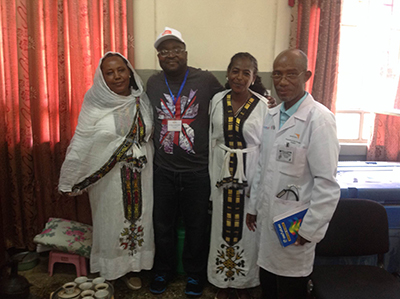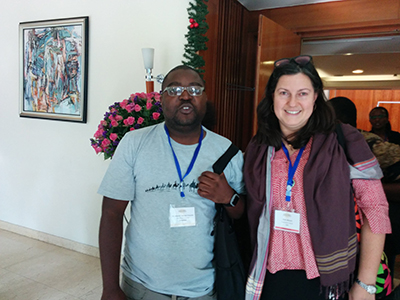
Picture: Malvern with Ann Starrs who is the President and CEO of The Guttmacher Institute
Malvern Chiweshe recently attended an African regional conference on abortion in Ethiopia. Read more about his experience:
Reflections on the African regional Conference on Abortion: From Research to Policy, Addis Ababa, Ethiopia, 29 November to 2 December 2016
As a follow up to the 2006 regional conference on abortion, 275 researchers, policy makers, donors and activists from 26 African countries and several Western countries met in Addis Ababa to celebrate a decade of progress and building the agenda for the future of abortion research to policy action. I met and networked with researchers from Senegal, Sierra Leone, South Africa, Cameroon, Nigeria, Zambia and Malawi amongst others Ethiopia was the perfect choice as in the past 10 years the country has made significant strides in providing safe abortion.
The 2005 law reform and the guidelines that followed have greatly reduced the number of women dying from unsafe abortion. Prior to the law reform the contribution of unsafe abortion to the maternal mortality rate (MMR) was 32% . A national study in 2014 showed a significant decline in the contribution to unsafe abortion to MMR which was between 6-9%. I was lucky to visit one of the many healthcare centres that is providing comprehensive abortion care. The Bishoftu health centre is located in Oromia region and services an area of more than 70 000. The centre has 8 midlevel abortion providers that have been trained by Ipas who provide first trimester abortions. The doctors pointed out the significant progress made towards providing safe abortions since the law reform and were happy of the technical support that Ipas was providing.

Picture: Malvern with a doctor and nurses from Bishoftu Health Centre in Oromia region, Ethiopia
The conference involved different types of presentations. These included plenary sessions, topical panels, expert interviews, dialogues, country roundtables, capacity building workshops and mentor pairings. The opening plenary addressed the all-important questions 1) What is the current state of abortion in Africa? 2) What major gaps remain in ensuring women have access to safe, high-quality abortion care? The conference chair, Ambassador Dr Eunice Brookman - Amissah of Ghana – a former health minister and former Ipas vice president – set out the scene of where we currently are as Africans – great progress in a few countries (Mozambique, Ethiopia, Malawi, Sierra Leone) was highlighted. Malawi and Sierra Leone are in the process of trying to reform restrictive abortion laws. Dr Akinrinola Bankole of Guttmacher presented on the statistics of abortions in Africa. One of the findings was that abortions in Africa are more likely to be done by married women. The topical panel on Addressing barriers to access: Legal, policy, regulatory and service delivery barriers to safe abortion featured papers from Tunisia, South Africa, Burkina Faso, Ghana, Zambia and Ethiopia.
The topical panel on addressing barriers to access: Legal, policy, regulatory and service delivery barriers to safe abortion featured papers from Tunisia, South Africa, Burkina Faso, Ghana, Zambia and Ethiopia. Tshego Bessenar of Ibis Reproductive Health South Africa presented on women’s perceptions of quality care in Ghana and South Africa. I also attended some expert interviews and one of the most helpful ones interviewed Dr Marijke Alblas who is a provider and trainer based in Cape Town. She shared her experiences of providing second trimester abortions in Cape Town. She highlighted the lack of clinical training for second trimester abortions in South Africa.
The lunch topical roundtable dialogues were a creative way of discussing pertinent topics. I took part in the values clarification and attitudinal transformation one. It was a great opportunity to share ideas around how the materials developed by Ipas could be reviewed, with Noreen Fagan of Ipas, who is in the process of producing new value clarification material. The country roundtables presented a chance to take part in group discussions and set the agenda going forward. I took part in both South African and Zimbabwean discussions. The South African discussions focused on removing barriers to an already liberal abortion laws. The consensus was to find ways to hold the department of health accountable. The Zimbabwean discussion was centred on how to start having conversations on abortion to challenge the silence that currently exists. A working group, of which I am part, was formed to try and chart a way forward.
During the capacity building workshops senior researchers and activists gave room for skills development. One of the more memorable ones was given by Dr Ernestia Coast of London School of Economics, Dr Ann Moore of Guttmacher and Dr Chima Izgubara of the African Population and Health Research Centre presented on qualitative and mixed methods in abortion research. The key take-away idea was that qualitative methods have a big role to play in abortion research and should not be seen as only there to complement quantitative methods. The conference also provided mentorship opportunities. I was paired with Tamara Fetters who is a Senior Research and Evaluation advisor for Ipas. This presented an opportunity of starting a relationship with an accomplished researcher in the field of abortion.

Picture: Malvern with Ann Moore who is a Principal Research Scientist with The Guttmacher Institute
